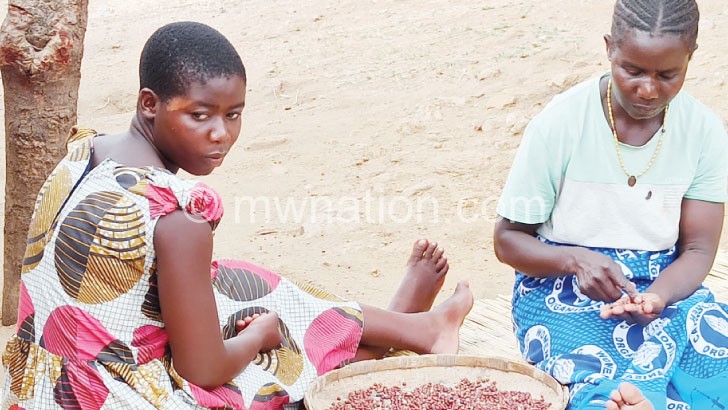Community addresses child marriages
Martha Chikumbutso, 18, is one of the girls in the area of Senior Chief Liwonde in Machinga District who returned to school after giving birth and being withdrawn from marriage.
She says peer pressure pushed her to start sexual relationships at a young age because she was made to believe that was the easy way out of poverty.
Narrates Martha: “One of my friends told me how easy it was for her to get money for basic necessities such as soap and clothes from boys and men and I wanted that portion for my life.
“It all started well when I met one man from the next village who promised to take care of all my needs. We started dating and my mother was not pleased with my behaviour.”

The teenager says she used to run away from home for days and when her mother tried to get her back, she would refuse until police got involved.
“I was in the hands of police for a couple of times. At first, I thought my mother was just being too harsh with me for no reason until recently when I realised she was doing that for my sake,” says Martha.
She adds that when her mother advised her on the importance of school, she thought getting married was even better than school.
Martha decided to elope with the boyfriend who at that time had just returned from South Africa where he went in search for greener pastures.
She explains: “My mother did all she could to disolve the marriage. But all her efforts were in vain until youth club members in our community intervened.
“But that was a little too late because I was already pregnant for the man and, unfortunately, even though I was staying with him, he denied responsibility and I had to go back home to my mother.”
Martha’s mother, Felistas Chikumbutso, who single-handedly cares for Martha and her three siblings, says when she realised that her daughter was pregnant, all the anger vanished and she promised to care for her.
She also encouraged her to return to school after delivery.
Said Chikumbutso: “I feared for her because she was too young to be a mother. I thought her delivery would be hard, but by the grace of God, everything went well.”
Martha returned to school six months after delivery and is now in Form Two at Namandanje Community Day Secondary School (CDSS).
She is among the four girls who have gone back to school after giving birth this year.
Namandanje CDSS headteacher Chikumbutso Gwada says Martha is adapting to the school environment.
“This term we have about four girls who have returned to school after giving birth and Martha is one of them. There are also some who reserved space to join us next term,” he says.
Approximately 50 percent of girls in Malawi are married before the age of 18 with the situation being fuelled up by socio-cultural factors, among others.
Despite the adoption of the Marriage, Divorce and Family Relations Bill in 2015 which changed the minimum marriage age from 16 to 18, there are still challenges on the implementation of the law.
Senior Chief Liwonde says his area is among those where young people migrate to South Africa for greener pastures and this has made most girls in the area to either get married or fall pregnant early.
To address the problem, the Family Planning Association of Malawi (Fpam) started implementing the Yes I do Project in the area in 2015 to protect girls from early marriages and teenage pregnancies and encourage them to make sound decisions regarding their lives.
Liwonde says ever since the project started in his area, there is so much change and the youth are now economically empowered following the training they had.
Fpam project coordinator Jimmy Kachale is happy that the project has achieved its objectives, including reducing child marriages.
“We have also seen a great improvement in terms of policies and by-laws. When we were starting the programme, we wanted Senior Chief Liwonde’s area to have its own community by-laws regarding child marriages and they now have that.
“It has not been an easy five-year journey. When we were going to the community, we wanted to empower them to be able to say Yes I Do and now we are able to leave them with the ability to make such decisions,” he says.
Senior Chief Liwonde says one of the by-laws regarding child marriages include ordering offenders who marry young children to pay a fine of a goat or more depending on the magnitude of the offence.
National Youth Council of Malawi chief executive officer Dingiswayo Jere says the time has come for everyone in society to take up a role in ending child marriages.
He also emphasises that traditional leaders, men and parents, in general, have a role to play in ending the malpractice.





